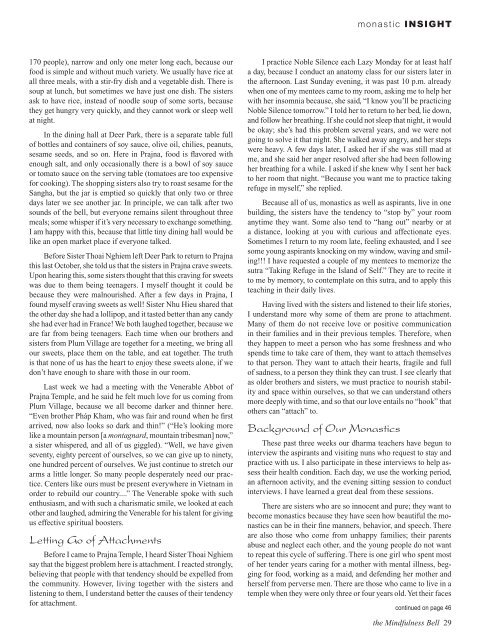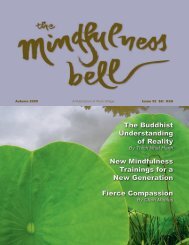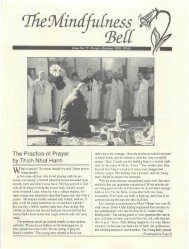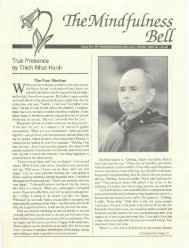Thich Nhat Hanh Jewish Roots The Better Way to Live Alone in the ...
Thich Nhat Hanh Jewish Roots The Better Way to Live Alone in the ...
Thich Nhat Hanh Jewish Roots The Better Way to Live Alone in the ...
- No tags were found...
Create successful ePaper yourself
Turn your PDF publications into a flip-book with our unique Google optimized e-Paper software.
monastic INSIGHT170 people), narrow and only one meter long each, because ourfood is simple and without much variety. We usually have rice atall three meals, with a stir-fry dish and a vegetable dish. <strong>The</strong>re issoup at lunch, but sometimes we have just one dish. <strong>The</strong> sistersask <strong>to</strong> have rice, <strong>in</strong>stead of noodle soup of some sorts, because<strong>the</strong>y get hungry very quickly, and <strong>the</strong>y cannot work or sleep wellat night.In <strong>the</strong> d<strong>in</strong><strong>in</strong>g hall at Deer Park, <strong>the</strong>re is a separate table fullof bottles and conta<strong>in</strong>ers of soy sauce, olive oil, chilies, peanuts,sesame seeds, and so on. Here <strong>in</strong> Prajna, food is flavored wi<strong>the</strong>nough salt, and only occasionally <strong>the</strong>re is a bowl of soy sauceor <strong>to</strong>ma<strong>to</strong> sauce on <strong>the</strong> serv<strong>in</strong>g table (<strong>to</strong>ma<strong>to</strong>es are <strong>to</strong>o expensivefor cook<strong>in</strong>g). <strong>The</strong> shopp<strong>in</strong>g sisters also try <strong>to</strong> roast sesame for <strong>the</strong>Sangha, but <strong>the</strong> jar is emptied so quickly that only two or threedays later we see ano<strong>the</strong>r jar. In pr<strong>in</strong>ciple, we can talk after twosounds of <strong>the</strong> bell, but everyone rema<strong>in</strong>s silent throughout threemeals; some whisper if it’s very necessary <strong>to</strong> exchange someth<strong>in</strong>g.I am happy with this, because that little t<strong>in</strong>y d<strong>in</strong><strong>in</strong>g hall would belike an open market place if everyone talked.Before Sister Thoai Nghiem left Deer Park <strong>to</strong> return <strong>to</strong> Prajnathis last Oc<strong>to</strong>ber, she <strong>to</strong>ld us that <strong>the</strong> sisters <strong>in</strong> Prajna crave sweets.Upon hear<strong>in</strong>g this, some sisters thought that this crav<strong>in</strong>g for sweetswas due <strong>to</strong> <strong>the</strong>m be<strong>in</strong>g teenagers. I myself thought it could bebecause <strong>the</strong>y were malnourished. After a few days <strong>in</strong> Prajna, Ifound myself crav<strong>in</strong>g sweets as well! Sister Nhu Hieu shared that<strong>the</strong> o<strong>the</strong>r day she had a lollipop, and it tasted better than any candyshe had ever had <strong>in</strong> France! We both laughed <strong>to</strong>ge<strong>the</strong>r, because weare far from be<strong>in</strong>g teenagers. Each time when our bro<strong>the</strong>rs andsisters from Plum Village are <strong>to</strong>ge<strong>the</strong>r for a meet<strong>in</strong>g, we br<strong>in</strong>g allour sweets, place <strong>the</strong>m on <strong>the</strong> table, and eat <strong>to</strong>ge<strong>the</strong>r. <strong>The</strong> truthis that none of us has <strong>the</strong> heart <strong>to</strong> enjoy <strong>the</strong>se sweets alone, if wedon’t have enough <strong>to</strong> share with those <strong>in</strong> our room.Last week we had a meet<strong>in</strong>g with <strong>the</strong> Venerable Abbot ofPrajna Temple, and he said he felt much love for us com<strong>in</strong>g fromPlum Village, because we all become darker and th<strong>in</strong>ner here.“Even bro<strong>the</strong>r Pháp Kham, who was fair and round when he firstarrived, now also looks so dark and th<strong>in</strong>!” (“He’s look<strong>in</strong>g morelike a mounta<strong>in</strong> person [a montagnard, mounta<strong>in</strong> tribesman] now,”a sister whispered, and all of us giggled). “Well, we have givenseventy, eighty percent of ourselves, so we can give up <strong>to</strong> n<strong>in</strong>ety,one hundred percent of ourselves. We just cont<strong>in</strong>ue <strong>to</strong> stretch ourarms a little longer. So many people desperately need our practice.Centers like ours must be present everywhere <strong>in</strong> Vietnam <strong>in</strong>order <strong>to</strong> rebuild our country....” <strong>The</strong> Venerable spoke with suchenthusiasm, and with such a charismatic smile, we looked at eacho<strong>the</strong>r and laughed, admir<strong>in</strong>g <strong>the</strong> Venerable for his talent for giv<strong>in</strong>gus effective spiritual boosters.Lett<strong>in</strong>g Go of AttachmentsBefore I came <strong>to</strong> Prajna Temple, I heard Sister Thoai Nghiemsay that <strong>the</strong> biggest problem here is attachment. I reacted strongly,believ<strong>in</strong>g that people with that tendency should be expelled from<strong>the</strong> community. However, liv<strong>in</strong>g <strong>to</strong>ge<strong>the</strong>r with <strong>the</strong> sisters andlisten<strong>in</strong>g <strong>to</strong> <strong>the</strong>m, I understand better <strong>the</strong> causes of <strong>the</strong>ir tendencyfor attachment.I practice Noble Silence each Lazy Monday for at least halfa day, because I conduct an ana<strong>to</strong>my class for our sisters later <strong>in</strong><strong>the</strong> afternoon. Last Sunday even<strong>in</strong>g, it was past 10 p.m. alreadywhen one of my mentees came <strong>to</strong> my room, ask<strong>in</strong>g me <strong>to</strong> help herwith her <strong>in</strong>somnia because, she said, “I know you’ll be practic<strong>in</strong>gNoble Silence <strong>to</strong>morrow.” I <strong>to</strong>ld her <strong>to</strong> return <strong>to</strong> her bed, lie down,and follow her breath<strong>in</strong>g. If she could not sleep that night, it wouldbe okay; she’s had this problem several years, and we were notgo<strong>in</strong>g <strong>to</strong> solve it that night. She walked away angry, and her stepswere heavy. A few days later, I asked her if she was still mad atme, and she said her anger resolved after she had been follow<strong>in</strong>gher breath<strong>in</strong>g for a while. I asked if she knew why I sent her back<strong>to</strong> her room that night. “Because you want me <strong>to</strong> practice tak<strong>in</strong>grefuge <strong>in</strong> myself,” she replied.Because all of us, monastics as well as aspirants, live <strong>in</strong> onebuild<strong>in</strong>g, <strong>the</strong> sisters have <strong>the</strong> tendency <strong>to</strong> “s<strong>to</strong>p by” your roomanytime <strong>the</strong>y want. Some also tend <strong>to</strong> “hang out” nearby or ata distance, look<strong>in</strong>g at you with curious and affectionate eyes.Sometimes I return <strong>to</strong> my room late, feel<strong>in</strong>g exhausted, and I seesome young aspirants knock<strong>in</strong>g on my w<strong>in</strong>dow, wav<strong>in</strong>g and smil<strong>in</strong>g!!!I have requested a couple of my mentees <strong>to</strong> memorize <strong>the</strong>sutra “Tak<strong>in</strong>g Refuge <strong>in</strong> <strong>the</strong> Island of Self.” <strong>The</strong>y are <strong>to</strong> recite it<strong>to</strong> me by memory, <strong>to</strong> contemplate on this sutra, and <strong>to</strong> apply thisteach<strong>in</strong>g <strong>in</strong> <strong>the</strong>ir daily lives.Hav<strong>in</strong>g lived with <strong>the</strong> sisters and listened <strong>to</strong> <strong>the</strong>ir life s<strong>to</strong>ries,I understand more why some of <strong>the</strong>m are prone <strong>to</strong> attachment.Many of <strong>the</strong>m do not receive love or positive communication<strong>in</strong> <strong>the</strong>ir families and <strong>in</strong> <strong>the</strong>ir previous temples. <strong>The</strong>refore, when<strong>the</strong>y happen <strong>to</strong> meet a person who has some freshness and whospends time <strong>to</strong> take care of <strong>the</strong>m, <strong>the</strong>y want <strong>to</strong> attach <strong>the</strong>mselves<strong>to</strong> that person. <strong>The</strong>y want <strong>to</strong> attach <strong>the</strong>ir hearts, fragile and fullof sadness, <strong>to</strong> a person <strong>the</strong>y th<strong>in</strong>k <strong>the</strong>y can trust. I see clearly thatas older bro<strong>the</strong>rs and sisters, we must practice <strong>to</strong> nourish stabilityand space with<strong>in</strong> ourselves, so that we can understand o<strong>the</strong>rsmore deeply with time, and so that our love entails no “hook” tha<strong>to</strong><strong>the</strong>rs can “attach” <strong>to</strong>.Background of Our Monastics<strong>The</strong>se past three weeks our dharma teachers have begun <strong>to</strong><strong>in</strong>terview <strong>the</strong> aspirants and visit<strong>in</strong>g nuns who request <strong>to</strong> stay andpractice with us. I also participate <strong>in</strong> <strong>the</strong>se <strong>in</strong>terviews <strong>to</strong> help assess<strong>the</strong>ir health condition. Each day, we use <strong>the</strong> work<strong>in</strong>g period,an afternoon activity, and <strong>the</strong> even<strong>in</strong>g sitt<strong>in</strong>g session <strong>to</strong> conduct<strong>in</strong>terviews. I have learned a great deal from <strong>the</strong>se sessions.<strong>The</strong>re are sisters who are so <strong>in</strong>nocent and pure; <strong>the</strong>y want <strong>to</strong>become monastics because <strong>the</strong>y have seen how beautiful <strong>the</strong> monasticscan be <strong>in</strong> <strong>the</strong>ir f<strong>in</strong>e manners, behavior, and speech. <strong>The</strong>reare also those who come from unhappy families; <strong>the</strong>ir parentsabuse and neglect each o<strong>the</strong>r, and <strong>the</strong> young people do not want<strong>to</strong> repeat this cycle of suffer<strong>in</strong>g. <strong>The</strong>re is one girl who spent mos<strong>to</strong>f her tender years car<strong>in</strong>g for a mo<strong>the</strong>r with mental illness, begg<strong>in</strong>gfor food, work<strong>in</strong>g as a maid, and defend<strong>in</strong>g her mo<strong>the</strong>r andherself from perverse men. <strong>The</strong>re are those who came <strong>to</strong> live <strong>in</strong> atemple when <strong>the</strong>y were only three or four years old. Yet <strong>the</strong>ir facescont<strong>in</strong>ued on page 46<strong>the</strong> M<strong>in</strong>dfulness Bell 29
















